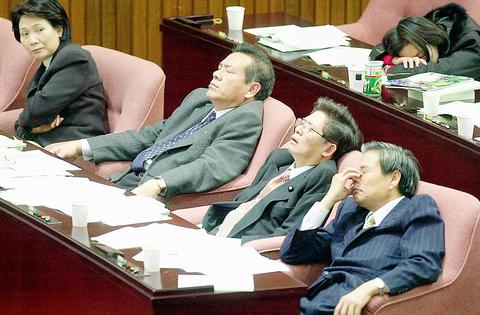After lengthy wheeling and dealing, the legislature yesterday wrapped up review of the 2002 fiscal budget without barring the foreign ministry from printing the words "Issued in Taiwan'' on new passport covers.
The lawmaking body passed the government budget by paring NT$12 billion, or 0.7 percent, from the projected spending of NT$1.58 trillion for this year.
But opposition lawmakers agreed to tone down the language of a resolution that bans the Ministry of Foreign Affairs from altering the country's title shown on passports.

PHOTO: AFP
They noted that the upcoming addition of the English phrase "Issued in Taiwan" would not flout the resolution.
"Since the phrase will not appear right under or after the country's title, it will not cause confusion as we had warned," People First Party legislative leader Chou Hsi-wei (
A week ago, President Chen Shui-bian (
The announcement drew protest from the opposition alliance whose lawmakers had vowed to attach a rider to the budget bill barring the foreign ministry from amending the passport covers.
Going a step further, New Party legislator Elmer Fung (
Compromise came after the ministry agreed to add the English phrase "Issued in Taiwan" rather than "Taiwan" alone in Roman script to the new passport covers.
In a conciliatory gesture, the opposition-controlled legislature pared only NT$35 million from the ministry's funding.
The passage of the 2002 budget marked the end of the Fourth Legislature with newly elected lawmakers slated to take their oaths of office on Feb. 1.
Though the legislators approved a NT$16 billion fund aimed at providing senior citizens with a monthly allowance, they attached a clause requiring enactment of a welfare law before the money may be distributed.
The restriction emerged as a policy setback to the DPP government that has sought unsuccessfully for a second year to honor a key promise Chen made during his 2000 presidential campaign.
DPP legislative whip Tsai Huang-liang (蔡煌瑯) said he was pessimistic the allowance would ever be distributed, noting that the ruling party lacks the majority needed to give the fund a legal basis.
Still, during a dinner party with Cabinet officials, the president expressed satisfaction at the high number of bills passed.
He thanked all government agencies for putting in sustained efforts over the last months to push for passage of important legislation.
The legislative session, which concluded at 8pm, witnessed more than 170 bills made into law, despite its being shortened by one month before the legislative polls. A total of 112 lawmakers have vacated their offices or are preparing to do so, including those who have been sworn in as county commissioners or city mayors.
Though the budgetary cut came as the lowest in 10 years, the Cabinet-level Council for Cultural Affairs issued a statement in the evening, saying it regretted the removal of NT$500 million from its projected spending.
Chen Yu-chiou (
She said the council would strive to maintain its quality of performance with the slashed budget.
By contrast, proposals to slash honorary benefits for former president Lee Teng-hui (
Due to time constraints, a number of high-profile bills, notably the proposals to establish a financial supervisory board and provide monetary compensation for former soldiers, did not make it to second and third readings.
See Editorial

SECURITY: As China is ‘reshaping’ Hong Kong’s population, Taiwan must raise the eligibility threshold for applications from Hong Kongers, Chiu Chui-cheng said When Hong Kong and Macau citizens apply for residency in Taiwan, it would be under a new category that includes a “national security observation period,” Mainland Affairs Council (MAC) Minister Chiu Chui-cheng (邱垂正) said yesterday. President William Lai (賴清德) on March 13 announced 17 strategies to counter China’s aggression toward Taiwan, including incorporating national security considerations into the review process for residency applications from Hong Kong and Macau citizens. The situation in Hong Kong is constantly changing, Chiu said to media yesterday on the sidelines of the Taipei Technology Run hosted by the Taipei Neihu Technology Park Development Association. With

CARROT AND STICK: While unrelenting in its military threats, China attracted nearly 40,000 Taiwanese to over 400 business events last year Nearly 40,000 Taiwanese last year joined industry events in China, such as conferences and trade fairs, supported by the Chinese government, a study showed yesterday, as Beijing ramps up a charm offensive toward Taipei alongside military pressure. China has long taken a carrot-and-stick approach to Taiwan, threatening it with the prospect of military action while reaching out to those it believes are amenable to Beijing’s point of view. Taiwanese security officials are wary of what they see as Beijing’s influence campaigns to sway public opinion after Taipei and Beijing gradually resumed travel links halted by the COVID-19 pandemic, but the scale of

A US Marine Corps regiment equipped with Naval Strike Missiles (NSM) is set to participate in the upcoming Balikatan 25 exercise in the Luzon Strait, marking the system’s first-ever deployment in the Philippines. US and Philippine officials have separately confirmed that the Navy Marine Expeditionary Ship Interdiction System (NMESIS) — the mobile launch platform for the Naval Strike Missile — would take part in the joint exercise. The missiles are being deployed to “a strategic first island chain chokepoint” in the waters between Taiwan proper and the Philippines, US-based Naval News reported. “The Luzon Strait and Bashi Channel represent a critical access

Pope Francis is be laid to rest on Saturday after lying in state for three days in St Peter’s Basilica, where the faithful are expected to flock to pay their respects to history’s first Latin American pontiff. The cardinals met yesterday in the Vatican’s synod hall to chart the next steps before a conclave begins to choose Francis’ successor, as condolences poured in from around the world. According to current norms, the conclave must begin between May 5 and 10. The cardinals set the funeral for Saturday at 10am in St Peter’s Square, to be celebrated by the dean of the College